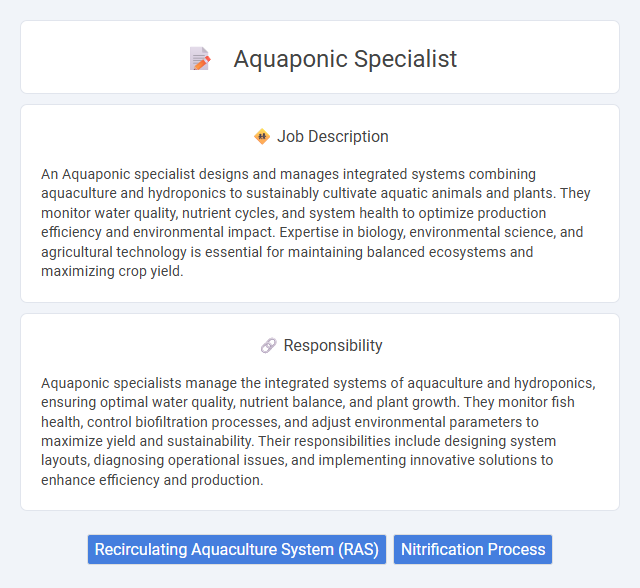
An Aquaponic specialist designs and manages integrated systems combining aquaculture and hydroponics to sustainably cultivate aquatic animals and plants. They monitor water quality, nutrient cycles, and system health to optimize production efficiency and environmental impact. Expertise in biology, environmental science, and agricultural technology is essential for maintaining balanced ecosystems and maximizing crop yield.
People with a strong interest in sustainable agriculture and aquatic ecosystems are likely to be well-suited for an aquaponic specialist role. Individuals who enjoy hands-on work, problem-solving, and monitoring biological systems may find this job fulfilling and manageable. Those with a background or willingness to learn about plant cultivation, fish care, and water quality management will probably adapt better to the technical and physical demands of the position.
Qualification
Aquaponic specialists require a strong background in aquaculture, hydroponics, and environmental science, often supported by a degree in agricultural science or biology. Proficiency in water quality management, nutrient cycling, and system design is essential for maintaining balanced ecosystems and optimizing plant and fish growth. Experience with data monitoring technologies and sustainable farming practices enhances the specialist's ability to troubleshoot and improve aquaponic operations efficiently.
Responsibility
Aquaponic specialists manage the integrated systems of aquaculture and hydroponics, ensuring optimal water quality, nutrient balance, and plant growth. They monitor fish health, control biofiltration processes, and adjust environmental parameters to maximize yield and sustainability. Their responsibilities include designing system layouts, diagnosing operational issues, and implementing innovative solutions to enhance efficiency and production.
Benefit
An aquaponic specialist likely enhances sustainable food production by integrating aquaculture and hydroponics, reducing water usage and promoting eco-friendly practices. They may improve crop yield and fish health through precise system management and nutrient balancing. The role could also offer opportunities for innovation in urban farming and contribute to food security advancements.
Challenge
The role of an aquaponic specialist likely involves navigating complex biological systems where balancing fish health and plant growth presents ongoing challenges. Managing water quality, nutrient levels, and pest control simultaneously may require advanced problem-solving skills and adaptability. Success in this position probably depends on continuous monitoring and innovation to optimize sustainable food production efficiency.
Career Advancement
Aquaponic specialists with expertise in integrated fish and plant cultivation systems often advance to roles such as aquaponics farm manager or research analyst in sustainable agriculture. Mastery of hydroponic technology, water quality management, and biological cycle optimization enhances opportunities in agricultural technology companies and environmental consultancy. Continuous skill development in automation and system design is crucial for leadership positions in urban farming projects and eco-friendly food production startups.
Key Terms
Recirculating Aquaculture System (RAS)
An Aquaponic Specialist with expertise in Recirculating Aquaculture Systems (RAS) manages integrated fish and plant production to optimize water use and nutrient cycling. They design and maintain RAS components such as biofilters, pumps, and tanks to ensure stable water quality and maximize fish growth rates. Proficiency in monitoring water parameters like dissolved oxygen, ammonia, nitrite, and pH is essential for maintaining system health and productivity.
Nitrification Process
Aquaponic specialists oversee the nitrification process, crucial for converting toxic ammonia from fish waste into nitrate, a vital nutrient for plant growth. They monitor and maintain beneficial bacteria colonies in biofilters, ensuring optimal conditions such as pH, temperature, and oxygen levels to maximize ammonia oxidation. Expertise in managing Nitrospira and Nitrosomonas bacteria directly enhances system efficiency, promoting sustainable aquaponic ecosystem health.
 kuljobs.com
kuljobs.com